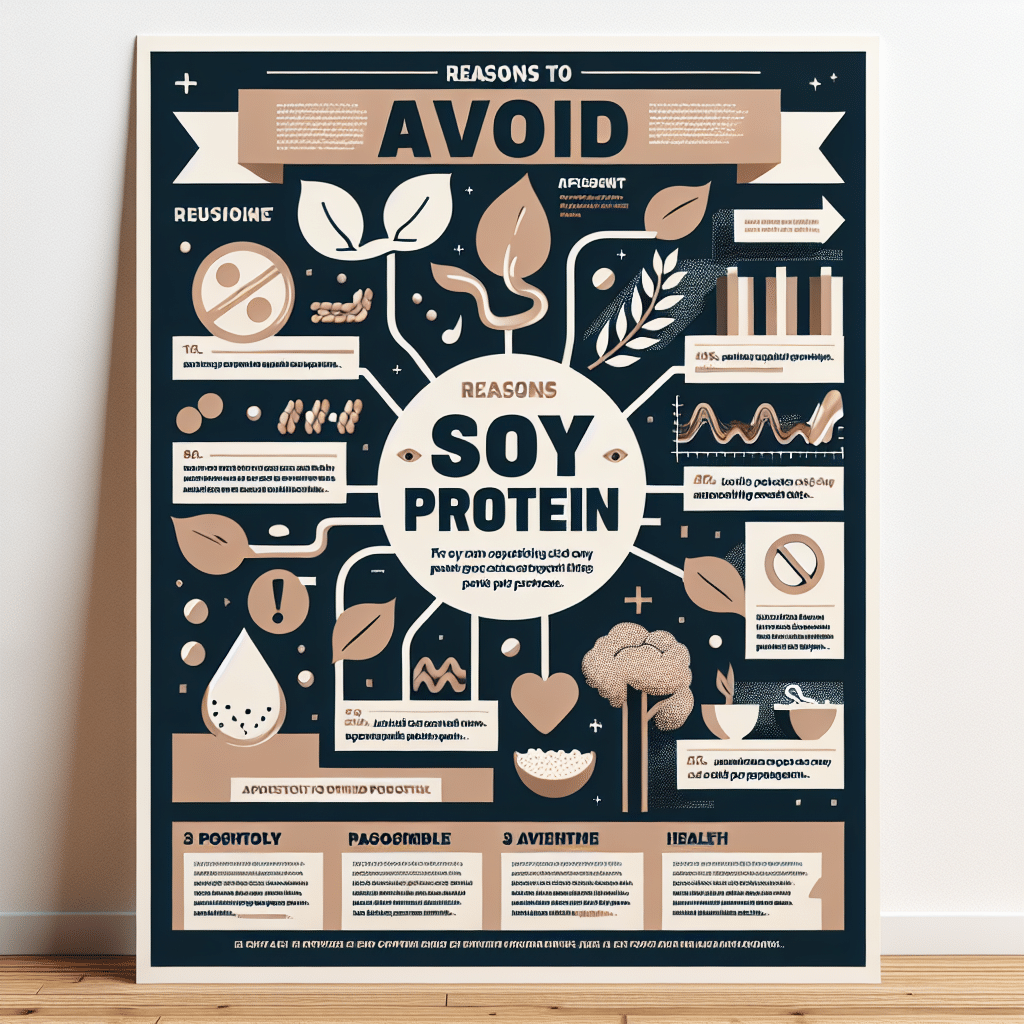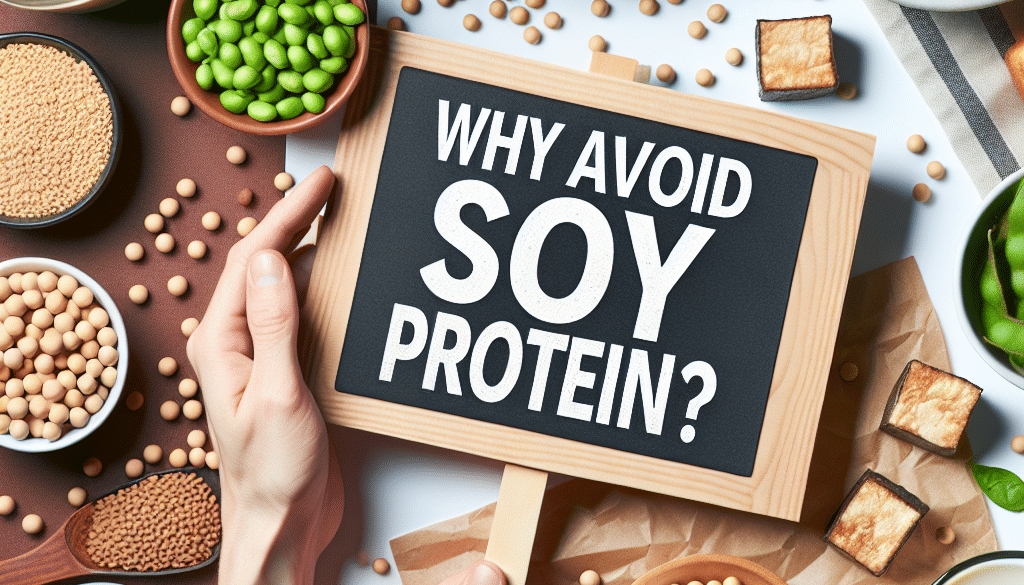Why Avoid Soy Protein?
-
Table of Contents
- Why Avoid Soy Protein: Understanding the Concerns
- The Controversy Surrounding Phytoestrogens
- Genetically Modified Soy Concerns
- Anti-Nutrient Content in Soy
- Environmental Impact of Soy Production
- Case Studies and Statistics
- Conclusion: Balancing the Pros and Cons
- Discover ETprotein’s Alternative Protein Products
Why Avoid Soy Protein: Understanding the Concerns

Soy protein has become a popular alternative to animal-based proteins, especially among vegetarians, vegans, and those with lactose intolerance. However, despite its widespread use and benefits, there are several reasons why some individuals and health experts suggest avoiding soy protein. This article delves into the potential drawbacks of soy protein, supported by research, examples, and statistics.
The Controversy Surrounding Phytoestrogens
Soy contains compounds known as phytoestrogens, which are plant-derived xenoestrogens that function similarly to the hormone estrogen in the human body. While some studies suggest that phytoestrogens can have health benefits, such as reducing the risk of heart disease and breast cancer, others raise concerns about their potential to disrupt endocrine function, particularly in men.
- Phytoestrogens may interfere with normal hormone levels, potentially affecting fertility and testosterone levels in men.
- Some research indicates that high consumption of soy products could lead to hypothyroidism, especially in individuals with pre-existing thyroid issues.
Genetically Modified Soy Concerns
A significant portion of soy produced globally is genetically modified (GM). GM soy is engineered to be resistant to herbicides, allowing farmers to use these chemicals more liberally to control weeds. The health implications of consuming GM foods are still debated, but concerns include:
- The potential for GM foods to trigger allergic reactions.
- The long-term health effects of consuming GM foods are not fully understood.
- Herbicide residues on GM soy could pose health risks.
Anti-Nutrient Content in Soy
Soybeans contain anti-nutrients, which are substances that can interfere with the absorption of essential nutrients. These include:
- Phytates, which can reduce the absorption of minerals like iron, zinc, and calcium.
- Enzyme inhibitors that can hinder protein digestion and lead to gastric distress.
- Oxalates, which can contribute to the formation of kidney stones.
Environmental Impact of Soy Production
The environmental impact of soy production is another reason some people choose to avoid soy protein. Large-scale soy farming has been linked to:
- Deforestation, particularly in the Amazon rainforest.
- Loss of biodiversity due to the conversion of diverse ecosystems into monoculture farms.
- Soil degradation and increased greenhouse gas emissions.
Case Studies and Statistics
Several case studies and statistics highlight the potential risks associated with soy protein consumption:
- A study published in the “Journal of Clinical Endocrinology & Metabolism” found that men who consumed high amounts of soy had lower sperm concentrations.
- According to the USDA, over 90% of soy produced in the United States is genetically modified.
- Research by the “World Wildlife Fund” indicates that soy farming is a significant driver of deforestation in the Amazon.
Conclusion: Balancing the Pros and Cons
In conclusion, while soy protein offers certain health benefits and is a convenient protein source for many, there are valid reasons to be cautious about its consumption. The potential hormonal effects, presence of anti-nutrients, concerns about genetically modified crops, and environmental impact are all factors to consider when deciding whether to include soy protein in your diet. It’s essential to weigh these concerns against the benefits and to consult with a healthcare provider if you have specific health conditions that might be affected by soy consumption.
Discover ETprotein’s Alternative Protein Products
If you’re looking for high-quality, non-soy protein options, ETprotein offers a range of organic bulk vegan proteins that could be an excellent fit for your dietary needs. Their products are characterized by a neutral taste, non-GMO, and allergen-free attributes, ensuring that you can enjoy the benefits of plant-based proteins without the concerns associated with soy. With a purity of over 98%, ETprotein’s offerings cater to various industries and dietary preferences.
About ETprotein:
ETprotein, a reputable protein and L-(+)-Ergothioneine (EGT) Chinese factory manufacturer and supplier, is renowned for producing, stocking, exporting, and delivering the highest quality organic bulk vegan proteins and L-(+)-Ergothioneine. They include Organic rice protein, clear rice protein, pea protein, clear pea protein, watermelon seed protein, pumpkin seed protein, sunflower seed protein, mung bean protein, peanut protein, and L-(+)-Ergothioneine EGT Pharmaceutical grade, L-(+)-Ergothioneine EGT food grade, L-(+)-Ergothioneine EGT cosmetic grade, L-(+)-Ergothioneine EGT reference grade and L-(+)-Ergothioneine EGT standard. Their offerings, characterized by a neutral taste, non-GMO, allergen-free attributes, with L-(+)-Ergothioneine purity over 98%, 99%, cater to a diverse range of industries. They serve nutraceutical, pharmaceutical, cosmeceutical, veterinary, as well as food and beverage finished product distributors, traders, and manufacturers across Europe, USA, Canada, Australia, Thailand, Japan, Korea, Brazil, and Chile, among others.
ETprotein specialization includes exporting and delivering tailor-made protein powder and finished nutritional supplements. Their extensive product range covers sectors like Food and Beverage, Sports Nutrition, Weight Management, Dietary Supplements, Health and Wellness Products, and Infant Formula, ensuring comprehensive solutions to meet all your protein needs.
As a trusted company by leading global food and beverage brands and Fortune 500 companies, ETprotein reinforces China’s reputation in the global arena. For more information or to sample their products, please contact them and email sales(at)ETprotein.com today.












